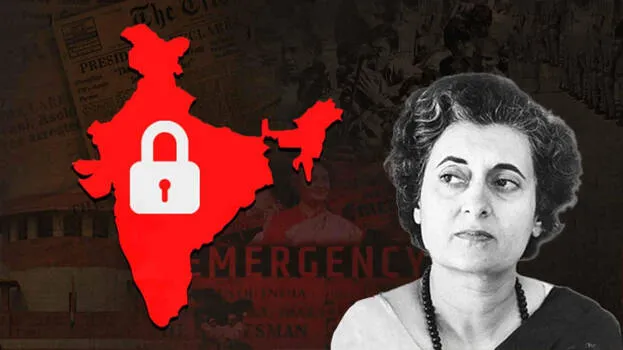

Today marks the 50th anniversary of the declaration of the Emergency, which severely restricted India's democratic tradition. The Emergency, imposed at midnight on June 25, 1975, was announced to the nation by the then Prime Minister Indira Gandhi in a radio address the next morning. Although the Prime Minister informed the people about this extraordinary measure in a very simplified manner, its severity was later revealed by the actions of the police and the government that trampled on civil rights. The Emergency lasted for 21 months, like a dark corridor of Indian democracy. The Emergency was declared under Article 352 (1) of the Constitution, which allows for the imposition of a state of emergency to overcome internal unrest.
The then President Fakhruddin Ali Ahmed signed the proclamation of the Emergency without any objection. The cartoon drawn by cartoonist Abu Abraham, depicting the President signing the proclamation of the Emergency from his bathtub and saying "If there are any more ordinances, just ask them to wait", was forever remembered as a vivid picture of how easily Indian democracy can be subverted. Following the declaration of Emergency, all senior opposition leaders like Jayaprakash Narayan, Morarji Desai, Charan Singh, Vajpayee, and LK Advani were arrested overnight and put in jail. Anyone suspected of being a political opponent was rounded up by the police and jailed without any trial. Students were subjected to brutal beatings by the police.
Some of those who went missing that day have not yet returned. Many precious lives, including Rajan, a student of the Kozhikode Regional Engineering College, were burned in the flames of the Emergency that destroyed democracy. Although Indira Gandhi pointed out that the opposition was trying to subvert democracy as the basis for declaring the Emergency, there was a hidden agenda behind it to ensure her own existence in politics by subverting court judgments and suppressing dissenting voices in the Congress party. Along with the arrest of opposition leaders, the central government also issued an order that the courts cannot use Articles 14, 21 and 22 of the Constitution, which provide fundamental rights to the citizens of the country.
The non-Congress governments, including the Karunanidhi government in South India, were dismissed and the Governor's rule was imposed. Censorship was imposed with a strict rule that newspapers could only publish what the government approved and gave permission. There are many examples in history that all dictators adopt such methods to hide the face of the truth. The background to the Emergency was the case related to Indira Gandhi's Lok Sabha elections. Raj Narain, the losing opponent candidate in the elections, filed a case in the Allahabad High Court alleging that government properties were being used for election campaigning and rigging.
On June 12, 1975, Justice Jagmohanlal Sinha declared Indira Gandhi guilty, cancelled her Lok Sabha seat and barred her from contesting any election for the next six years. Subsequently, protests broke out across the country, led by opposition leaders, demanding Indira Gandhi's resignation. A section within the Congress party itself demanded that Indira Gandhi step down. Indira Gandhi approached the Supreme Court against the Allahabad verdict, but Justice V. R. Krishna Iyer, a Malayali, stayed the Allahabad High Court verdict with conditions. Emergency was declared the day after this Supreme Court verdict. Opposition political parties and organizations like the RSS were banned.
The group in the corridors of power led by Sanjay Gandhi later controlled everything beyond Indira Gandhi. All democratic values were slaughtered. Why, even the constitutional institutions and the courts were made to look like pawns. Indira Gandhi tried to rewrite the laws of the country according to her will. It was also able to make laws in a way that completely exonerated Indira Gandhi from the election rigging case. Since the press and media were silenced, the Prime Minister was not even able to recognize the democratic destruction that took place during the Emergency. The truths of the regime became what the officials were conveying. The country's intelligence agencies informed the Prime Minister that if elections were held early in the country, she could return to power with a huge majority because there was a 'popular government'!
The Prime Minister, who had been far distanced from the people, believed the words of the officials and announced the elections, released the opposition leaders from prison, and lifted the Emergency. The elections held in 1977 proved how much the Indian people value democracy. Not only Indira Gandhi and Sanjay Gandhi but also most of their loyal followers lost the elections. The Congress won only 153 seats. Of these, 92 seats were won in the southern Indian states where the horrors of the Emergency were relatively less.
The biggest mistake of the Emergency was giving the police the power to arrest and jail innocent people without any case and without informing their families. The Shah Commission, which investigated the crimes of the Emergency, reported that more than one lakh people were arrested and tortured without trial. Political prisoners and activists were brutally tortured in lock-ups and jails. Kerala Chief Minister Pinarayi Vijayan was also a victim of brutal torture during the Emergency. There were many infamous illegal incidents like forced sterilization and the Turkman Gate incident.
Nationals have proven beyond a doubt that the Emergency is the biggest stain on Indian democracy by casting their vote, which is their right as citizens. June 25 has come again, reminding us of the dark days of the Emergency. A day that democratic believers in the country will always remember with fear. All democratic believers who do not want the country to go into another Emergency should not hide in the shadows and keep this day in mind. Having memories is also a great defence.
Today, the lesson that any administrative action that violates the civil rights of a person must be rejected is turning fifty years old.